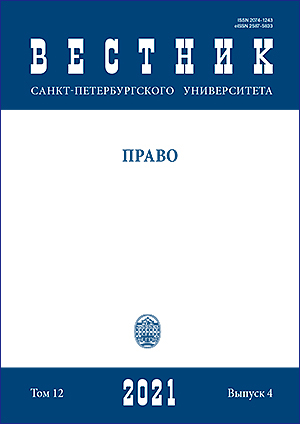Legal status of the president of the court as a judge and organizer of judicial activities: Structure and models
DOI:
https://doi.org/10.21638/spbu14.2021.407Аннотация
The article considers the structure of the legal status of the president of a general jurisdiction court in the Russian Federation. The authors show that the term “legal status” is much more appropriate for court presidents than “legal position” and “legal state”. A structure of the legal status of the president of a general jurisdiction court consisting of five elements is proposed: the procedure for appointment; guarantees of judicial activity determining the peculiarities of the court president’s legal status compared to other holders of state power; competence of the court president; procedure for activity termination; responsibility. The article shows that though the legal status of the president is derived from the legal status of a judge, it has significant differences since a judge is assumed to have experience in professional activities, unique personal qualities, organizational and communicative skills, and therefore it is necessary to consider the professional and titular legal status of the court president. The key challenges associated with the development of the legal status of the president of a general jurisdiction court in Russia are identified, such as the lack of a clear hierarchy of sources where international legal standards are present in regard to both a mandatory and advisory nature, various legal acts, decisions of judicial bodies, documents from the judicial community; many issues determining the legal status of presidents of general jurisdiction courts are duplicated in a number of sources; the powers of court presidents can be determined in documents that, at first glance, regulate completely different types of public relations (enforcement proceedings, combating corruption, preventing child neglect and juvenile offences, etc.). The work proposes ways to improve the regulatory framework governing the legal status of the president of a general jurisdiction court in Russia.
Ключевые слова:
legal status, court president, courts of general jurisdiction, elements of legal status, legal position, legal state
Скачивания
Библиографические ссылки
Загрузки
Опубликован
Как цитировать
Выпуск
Раздел
Лицензия
Статьи журнала «Вестник Санкт-Петербургского университета. Право» находятся в открытом доступе и распространяются в соответствии с условиями Лицензионного Договора с Санкт-Петербургским государственным университетом, который бесплатно предоставляет авторам неограниченное распространение и самостоятельное архивирование.






